Related Research Articles

The 2002 Tour de France was a multiple-stage bicycle race held from 6 to 28 July, and the 89th edition of the Tour de France. The event started in Luxembourg and ended in Paris. The Tour circled France counter-clockwise, visiting the Pyrenees before the Alps. It has no overall winner—although American cyclist Lance Armstrong originally won the event, the United States Anti-Doping Agency announced in August 2012 that they had disqualified Armstrong from all his results since 1998, including his seven Tour de France wins from 1999 to 2005; the Union Cycliste Internationale confirmed the result.

Hendrik Gerardus Joseph "Joop" Zoetemelk is a Dutch former professional racing cyclist. He started and finished the Tour de France 16 times, which were both records when he retired. He also holds the distance record in Tour de France history with 62,885 km ridden. He won the 1979 Vuelta a España and the 1980 Tour de France.

The 1997 Tour de France was the 84th edition of the Tour de France and took place from 5 to 27 July. Jan Ullrich's victory margin of 9:09 was the largest margin of victory since Laurent Fignon won the 1984 Tour de France by 10:32. Since 1997 no rider has had this convincing of a win with the closest margin to Ullrich's victory being Vincenzo Nibali winning the 2014 Tour de France with a gap of 7:39. Ullrich's simultaneous victories in both the general classification and the young riders' classification marked the first time the same rider had won both categories in the same Tour since Laurent Fignon in 1983. The points classification was won by Ullrich's teammate Erik Zabel, for the second time, and their team Team Telekom also won the team classification. The mountains classification was won by Richard Virenque for the fourth time.

The 2006 Tour de France was the 93rd edition of the Tour de France, one of cycling's Grand Tours. It took place between the 1st and the 23rd of July. It was won by Óscar Pereiro following the disqualification of Floyd Landis. Due to the United States Anti-Doping Agency announcing on August 24, 2012, that they had disqualified Lance Armstrong, a former teammate of Landis, from all of his results since August 1, 1998, including his seven Tour de France titles from 1999 to 2005, this is also the first Tour to have an overall winner since 1998. By terms of margin of victory the 2006 Tour was the 3rd closest of all time.

The 1980 Tour de France was the 67th edition of the Tour de France. The total distance was 3,842 km (2,387 mi) over 22 stages. In the first half of the race, Bernard Hinault started out strong by winning the prologue and two stages. However, knee problems forced Hinault to abandon the race while still in the lead. Joop Zoetemelk became the new leader, and defended that position successfully. Just as in 1979, when Hinault and Zoetemelk finished nearly a half hour ahead of the rest of the field, the 1980 edition was a battle between these two riders until Hinault abandoned. At the time Hinault was just 21 seconds ahead of Zoetemelk and the race was about to enter the Pyrenees. Zoetemelk did not wear the yellow jersey during stage 13 though he did in every stage thereafter finishing the race with nearly a seven-minute advantage over second place Hennie Kuiper. It was his first Tour victory in his tenth attempt, after already having finished second in five editions.

The 1984 Tour de France was the 71st edition of the Tour de France, run over 4,021 km (2,499 mi) in 23 stages and a prologue, from 29 June to 22 July. The race was dominated by the Renault team, who won the team classification and ten stages: Renault's French rider Laurent Fignon won his second consecutive Tour, beating former teammate Bernard Hinault by over 10 minutes.

The 1968 Tour de France was the 55th edition of the Tour de France, one of cycling's Grand Tours. It took place between 27 June and 21 July, with 22 stages covering a distance of 4,492 km (2,791 mi). Eleven national teams of 10 riders competed, with three French teams, two Belgian teams and one from Germany, Spain, the United Kingdom, Italy, the Netherlands, and a combined Swiss/Luxembourgian team.
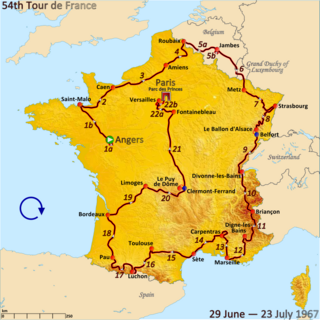
The 1967 Tour de France was the 54th edition of the Tour de France, one of cycling's Grand Tours. It took place between 29 June and 23 July, with 22 stages covering a distance of 4,779 km (2,970 mi). Thirteen national teams of ten riders competed, with three French teams, two Belgian, two Italian, two Spanish, one each from Germany, United Kingdom and the Netherlands, and a Swiss/Luxembourgian team.

The 2007 Tour de France the 94th running of the race, took place from 7 to 29 July. The Tour began with a prologue in London, and ended with the traditional finish in Paris. Along the way, the route also passed through Belgium and Spain. It was won by Spanish rider Alberto Contador.

The 1964 Tour de France was the 51st edition of the Tour de France, one of cycling's Grand Tours. It took place between 22 June and 14 July, with 22 stages covering a distance of 4,504 km (2,799 mi). Stages 3, 10 and 22 were all two-part stages with the first half being a regular stage and the second half being a team or individual time trial. It was the only Tour de France to include a mid-stage climb to the Alpe d'Huez ski resort. The race was eventually won by Jacques Anquetil following an epic shoulder-to-shoulder battle with Raymond Poulidor during stage 20.

The 1961 Tour de France was the 48th edition of the Tour de France, one of cycling's Grand Tours. It took place between 25 June and 16 July, with 21 stages covering a distance of 4,397 km (2,732 mi). Out of the 132 riders who started the tour, 72 managed to complete the tour's tough course. Throughout the 1961 Tour de France, two of the French national team's riders, André Darrigade and Jacques Anquetil held the yellow jersey for the entirety 21 stages. There was a great deal of excitement between the second and third places, concluding with Guido Carlesi stealing Charly Gaul's second-place position on the last day by two seconds.

Wouter "Wout" Wagtmans was a Dutch road bicycle racer.
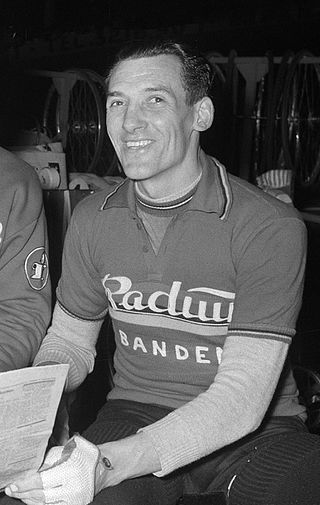
Gerardus "Gerrit" Petrus Voorting was a Dutch road cyclist who was active between 1947 and 1960. As an amateur he won the silver medal in the individual road race at the 1948 Summer Olympics in London. In his professional career Voorting won two Tour de France stages and wore the yellow jersey for 4 days. Voorting died on 30 January 2015 in his home in Heemskerk at the age of 92, within a week of two other members of the Dutch men's team pursuit squad, Henk Faanhof and Joop Harmans. He was the elder brother of Olympic cyclist Adrie Voorting.
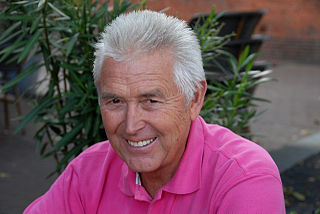
Gerben Karstens was a Dutch professional racing cyclist, who won the gold medal in the 100 km team trial at the 1964 Summer Olympics, alongside Bart Zoet, Evert Dolman, and Jan Pieterse. At the same Olympics he finished 27th in the individual road race. Karstens ranks 6th in all-time stage wins in Vuelta a España history.
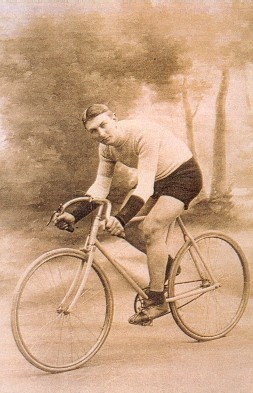
Jean Alavoine was a French professional cyclist, who won 17 stages in the Tour de France - only eight riders have won more stages - and wore the yellow jersey for five days.

Albertus "Ab" Geldermans is a former Dutch professional road bicycle racer and directeur sportif. He was professional from 1959 to 1966 and rode seven editions of the Tour de France. In 1962 he finished fifth overall and wore the yellow jersey for two days. In 1960 Geldermans won Liège–Bastogne–Liège and won the Deutschland Tour. In 1962 he was Dutch road race champion. Afterwards he became directeur sportif of the Dutch national cycling team that competed in the 1967 Tour de France and directed Jan Janssen to victory in the 1967 Tour de France.
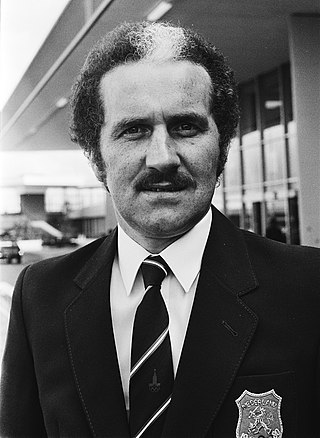
Marinus "Rini" Wagtmans is a former Dutch professional road bicycle racer. He was the nephew of Wout Wagtmans, a former professional who had won the Tour de Romandie stage race in 1952. His father was a masseur while Tour de France stage winner Wim van Est was his neighbour. In 1968 Rini turned professional. The following year he finished third overall in the 1969 Vuelta a España. He rode four editions of the Tour de France and won three stages, one in 1970, one in 1971 and one in 1972. In the 1970 Tour de France he finished fifth overall. In 1971 Tour de France while riding for Molteni, he wore the yellow jersey as leader of the general classification for one day but teammate and team leader Eddy Merckx took the jersey the following day. He also won two stages in the 1970 Vuelta a España. Wagtmans was known as one of the best descenders in the peloton. His hair earned him the nickname "witte bles", which translates as "white blaze". Wagtmans ended his career early due to heart problems. Afterwards he was a cycling coach, a member for the Royal Dutch Cycling Union, and then a successful businessman. In 2005, Wagtmans was invested as a Knight of the Order of Orange-Nassau. In 2006, Wagtmans’ biography was published.

Joseph Groussard is a former French professional road bicycle racer. Groussard was professional from 1954 to 1968. He rode 9 editions of the Tour de France where he won one stage in the 1959 Tour de France and wore the yellow jersey as leader of the general classification for one day in 1960 Tour de France. Other victories include two wins in Paris–Camembert, stage wins in Paris–Nice, wins in Critérium International and Four Days of Dunkirk and the 1963 edition of Milan–San Remo. In 1965, Groussard became the Lanterne rouge in the 1965 Tour de France.
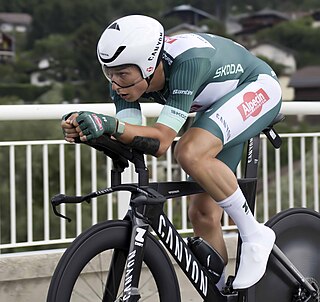
The points classification is a secondary competition in the Tour de France, which started in 1953. Points are given for high finishes in a stage and for winning intermediate sprints, and these are recorded in a points classification. It is considered a sprinters' competition. The leader is indicated by a green jersey, which has become a metonym for the points classification competition.
This is a list of records and statistics in the Tour de France, road cycling's premier competitive event.
References
- ↑ "Bloc'Notes: la Georges Groussard – 18 juin 2005 –". www.cyclosport.com. 31 May 2005. Archived from the original on 5 February 2012. Retrieved 23 February 2012.
- ↑ "Tour de France 1965 :De Deelnemers". Netherlands: tourde-france.nl. Archived from the original on 28 September 2007.
- ↑ "Tour de France 1967 :De Deelnemers". Netherlands: tourde-france.nl. Archived from the original on 28 September 2007.